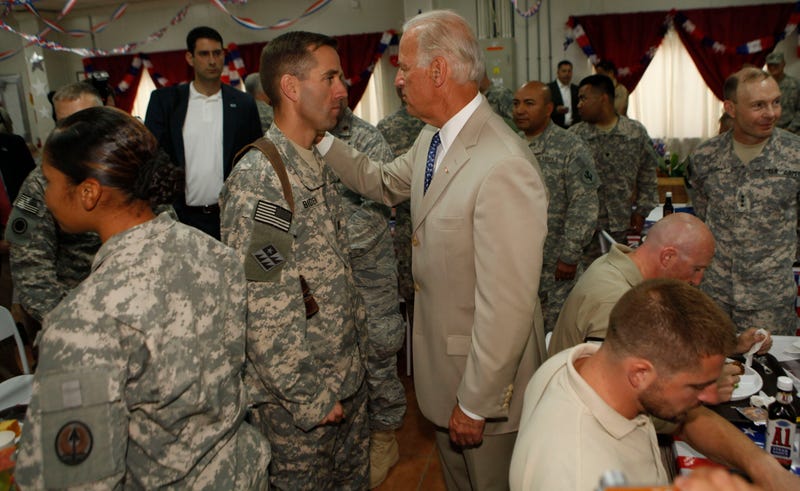
Millions of veterans have been exposed to toxic hazards just since 2001, along with generations of troops who came before. But after nearly two decades of war, the Department of Veterans Affairs still denies the majority of claims for burn pits, one of the most common exposures troops experience.
Now, with a president in office who has experienced loss he blames on military toxic exposures, combined with more attention for the issue than ever before, veterans, advocates and lawmakers -- including some exposed during their own service -- are hopeful that significant progress might be made to provide care and benefits to veterans ill and dying, and their surviving family members.
Retired Staff Sgt. William Thompson, who has had multiple double-lung transplants and many other health concerns because of his exposure to burn pits and airborne particulates while deployed, told members of Congress Wednesday veterans need help now. He's just the latest in a series of veterans who have for years told lawmakers their stories, hoping for change.
"I gave my lungs for my country," Thompson said. "I've heard so many times VA say, 'We don't know how to treat you,'" or that he doesn't qualify for benefits.
Thompson's doctor, Anthony Szema, director of the International Center of Excellence in Deployment Health and Medical Geosciences, said that Thompson's original lungs contained burned particles from burn pits.
As of March 10, 233,406 veterans and service members have added themselves to the VA Airborne Hazards and Open Burn Pit Registry, open to those who have served since 1990. VA has previously estimated as many as 3.5 million veterans and troops have been affected by burn pits alone.
Surveys from veteran service organizations including Iraq and Afghanistan Veterans of America and Wounded Warrior Project show a majority of respondents report toxic exposures of some kind, and most said they were not receiving care for those exposures at VA. Veteran service organizations have made multiple presentations to Congress in recent years arguing that toxic exposures should be a top legislative priority. Veterans have testified before lawmakers again and again about the rare cancers and other severe, and often fatal, conditions they believe have been caused by toxic exposures they suffered, or lost friends to.
One of those was Beau Biden, a major in the Delaware Army National Guard who deployed to Balad Air Force Base in Iraq in late 2008. For much of 2009, he served at Balad and also at Camp Victory in Baghdad. Both of those sites used burn pits to dispose of all manner of military trash and waste, a common practice for deployed U.S. forces and their contractors. Beau Biden was diagnosed with stage 4 glioblastoma multiforme in 2013. He died of that brain cancer in 2015 at 46 and his family believes it was caused by his exposure to the burn pits.
"(Beau) volunteered to join the National Guard at age 32 because he thought he had an obligation to go," Biden said during a speech at a 2019 Service Employees International Union convention. "And because of exposure to burn pits -- in my view, I can't prove it yet -- he came back with stage 4 glioblastoma."
In a 2020 Veterans Day speech, Biden said, "We have to make sure that no veteran is locked out of treatment for conditions related to toxic exposure." In a 2019 CNN town hall in Iowa also on Veterans Day, Biden mentioned the loss of his son and said, "One of those things we should be looking at is those burn pits ... When all the firemen in New York went down to 9/11, and so many got cancer, and particularly brain cancer, well, that’s what’s happening. More people are coming home from Iraq with brain cancer than ever before, than any other war."
Celebrity comedian and activist Jon Stewart also has joined the effort to help veterans affected by toxic exposures after championing 9/11 first responders. Stewart said last year he believes the cost of caring for veterans and their families affected by toxic exposures should come from American warprofiteers.
"If we've got the money to go to war, we have to make sure we have the money to take care of people when they come home from war," Stewart said last year. "I would like to see the people who profit off of war have to kick in for the people who suffer from the effects of war. I believe that in the way that oil and gas companies have to kick a 10 percent contingency on spills, I think war profiteers should kick in a 10 percent contingency plan, so that (veterans) don't have to always come, hat in hand, begging for money because their brothers and sisters are still dying from the things that they saw and faced in downrange war zones."
But progress remains slow, despite lawmakers continually saying they don't want to repeat the mistakes of Agent Orange exposures, forcing veterans to wait decades for care and benefits. Meanwhile, VA continues to deny thousands of claims.
VA has received 15,513 claims from veterans of conditions specifically related to burn pits. The most common issues claimed are respiratory conditions. VA has denied 11,964 burn pit-related claims, or about 77%, approving 3,549, or about 29%, according to data provided to Connecting Vets.
A lack of evidence and documentation is consistently cited as a reason for the Departments of Defense and Veterans Affairs to deny veterans' exposures to environmental hazards. Defense Department data collected to determine health risks from airborne particulate matter, or the location of burn pits or troop movements, is largely incomplete and unreliable, and both massive federal agencies place the burden on veterans and their families to prove they were exposed, when and where with documents that often don't exist.
Limitations in existing studies and lack of quality data mean there's "insufficient evidence" to prove veterans' respiratory illnesses are caused by burn pit and other airborne hazard exposure in Afghanistan and Persian Gulf countries and a new approach is needed, experts said in a report in September 2020. A committee of National Academies of Sciences, Engineering and Medicine researchers said better, more thorough studies are necessary to definitively link respiratory illnesses in troops and veterans to their exposure to burn pits and airborne hazards while deployed in the Southwest Asia Theater.
But there is some evidence suggesting exposures can cause illnesses, the experts acknowledged. There was "limited or suggestive evidence" of a link between service in the Gulf War from 1990 to 1991 and for those who served in operations after Sept. 11, 2001, who experience "chronic persistent cough, shortness of breath and wheezing," according to existing data. But it's not enough to definitively prove a connection without better studies, experts said.
Post-9/11 veterans are far from the only service members exposed to toxicants that harmed their health and in some cases proved fatal. Toxic exposures seem to have touched each generation of American service members.
Veterans, advocates and lawmakers are still struggling to ensure Vietnam-era veterans exposed to toxic hazards such as Agent Orange receive the care and benefits they need, but thousands are still waiting. Congress, as part of the 2021 National Defense Authorization Act, passed measures to force VA to cover bladder cancer, hypothyroidism and Parkinson's-like symptoms for veterans exposed to Agent Orange, but it could be years before those veterans see those benefits. VA Secretary Denis McDonough pledged to work to expedite the process, as well as consider extending benefits to those with hypertension, another disease linked to Agent Orange lawmakers were not successful in passing as part of the massive defense bill last year.
Several bipartisan legislative efforts were introduced last year, and reintroduced this year, to create a path to VA care or benefits for veterans sick from toxic exposures, and lawmakers recommitted to passing those this Congress during a Senate Veterans Affairs Committee hearing on military toxic exposures Wednesday.
While burn pits may be among the most common toxic exposures for post-9/11 and other veterans, thousands of veterans may have been exposed to other significant hazards at a retrofitted former Soviet airbase in Uzbekistan known as K2 or Camp Stronghold Freedom, including dangerous levels or radiation, "black goo" oozing up from the ground and more.
Documents declassified in 2020 showed the Department of Defense knew service members were exposed to multiple toxic substances or hazardous materials at the base at the onset of the War on Terror that later led to cancers and other severe or fatal health conditions. But, like with burn pits, Agent Orange and other exposures, VA has continually denied many of those veterans care and benefits, again blaming a lack of evidence.
Service members and their families also have been exposed to toxicants and hazards within the United States, including on military bases such as Camp Lejeune, where evidence showed hazardous levels of harmful "forever chemicals" such as PFAS in the water. Some reports suggest as many as 600 military installations may be affected by similar pollutants.
No one appears willing to take responsibility for the devastation caused by military toxic exposures. A federal judge in 2017 dismissed a major lawsuit from veterans and their families against defense contractor KBR for its use of burn pits they argued caused long-term health conditions including fatal cancers and respiratory disorders. The judge dismissed the lawsuit, arguing that the contractor could not be held liable for the Defense Department's decision to operate burn pits.
The U.S. Supreme Court has now indicated it may consider the case of Texas state trooper Leroy Torres, who says he lost his job after deploying as an Army Reserve captain in 2007 and falling ill from burn pit exposure. Torres was stationed at the same airbase as Beau Biden, where a 10-acre open-air burn pit operated 24-hours per day for years. Torres and his wife Rosie founded an advocacy group, Burn Pits 360, in 2011 to help push for care and benefits for veterans like him exposed to the toxic fires.
"They build as big as this auditorium," Biden said of the burn pits at the 2019 town hall "It's about eight-to-10-feet-deep and they put everything in it they want to dispose of and can't leave behind, from flammable fuel to plastics to all range of things.
"It's not because my son died. (He) went from very, very healthy but he lived in the bloom of those burn pits for a long time. He's passed, it doesn't affect him," Biden continued. "But the point is that every single veteran shouldn't have to prove and wait until science demonstrates beyond a doubt … We just have to change the way we think a little bit."
—
Reach Abbie Bennett: abbie@connectingvets.com or @AbbieRBennett.
Sign up for the Connecting Vets weekly newsletter to get more stories like this delivered to your inbox.

—
Reach Abbie Bennett: abbie@connectingvets.com or @AbbieRBennett.
Sign up for the Connecting Vets weekly newsletter to get more stories like this delivered to your inbox.






